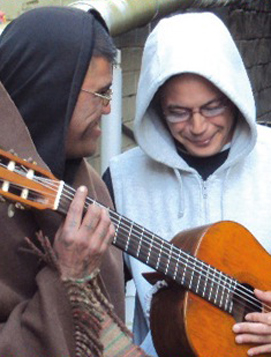The moment I walked into the venue I knew it was going to be unlike any performance I had ever seen before. The concept of the Auckland Fringe Festival show Homeless Economics was a look into the state of homelessness in Auckland…
“Homeless Economics” started before it started. Let me explain.
I walked up from Aotea Square from my prior Auckland Fringe commitment [“Chalk” review] to the Auckland City Mission on Hobson St (not far from my old inner-city apartment). The moment I walked into the venue I knew it was going to be unlike any performance I had ever seen before.
The concept of the show was a look into the state of homelessness in Auckland. Written by the homeless; directed and performed by the homeless – at Auckland’s main homeless shelter. The concept was overwhelming to read in print; the experience itself was to be legitimately spiritual.
I knew something was up when a Maori lady walked out of the front office and threw out the off-hand humour-tinged comment, “All your drugs; bring them here,” riffing ironically on the Drug and Alcohol Free policy stapled to the wall next to me. The chap in front of me told me “these seats will be full of hooting, howling, laughing, clapping, crying people”, all of which happened over the next hour. The lady – Maeve, as it later turned out – threw a wet rag at the guy next to me, and told him in no uncertain terms to wipe down the pew behind us.
It then dawned on me that the show had already started; the moment we walked through the door we became the homeless, and were treated as such. This was the City Mission after all. The lines between reality and performance had blurred into nothingness. The mostly well-heeled members of the audience became homeless, and the homeless became thespians – playing themselves. It felt like a different world, and it was for me; their world became ours within minutes and we had no say in the matter.
The “Dining Menu” of the performance contained a series of thematic interludes. The “Rage Against the Machine” portions, as served up by Huia – an enigmatic force amongst the Hobson Street Theatre Company, flew between pure irrationality and visceral clarity in dealing with the social powers of this city (i.e., WINZ, the bank, court, Citizens Advice, the church).
Throughout the show, each of the actors were given a chance to tell their story in their own unique way. Jem told his heart-wrenching tale of family love and violence through original song. Shadow delivered his rags-to-not-quite-riches story of going from asking a Japanese harmonica-playing street busker for money, to actually becoming a harmonica teacher and opening for reggae-heroes Trinity Roots. To prove it was all true, he let loose on his harmonica at the end; with intermittent verses detailing life on the city streets (he also had a lovely voice).

Particularly humorous were Daniel’s tales of sneaking into the parliamentary chambers, being given a mince pie by the then Youth Affairs minister Deborah Morris, and taking what is probably the best mug shot of the Queen’s husband in existence. I’d say the Duke of Edinborough award lived up to its reputation.
“Homeless Economics” wasn’t all fun though, with some dark twisted humour (and genuinely good theatre) through the “Red Tape” scene, as part of the “What’s For Dinner” series. All I’ll say is that finding food in this city without money is no Martha Stewart cooking show.
The individual performances ranged from amateur to compelling, but any critique of the acting ability of the players is kind of irrelevant in light of the social context from which “Homeless Economics” has emerged. After the show I had a quick chat to budding actor, Huia, who shared with me the sometimes painful (and annoying) process of getting a bunch of marginalised street people together to create a professional performance.
It all came together on the night, and I applaud the efforts of the City Mission in their use of such an experience to help broken people heal (effectively putting arms and legs on the mission statement outlined in the last page of the show’s programme).
There were no social walls that night. The small room contained everyone from destitute street people to former local TV personalities. Everything was stripped away, and we were all revealed to be the same thing – human. It was post-racial, post-status, post-class, post-everything; it was really special.
On the scooter ride home to my cosy-elitist Parnell flat afterwards, I saw one the local guys I see every night pushing his bike around, laden with all his earthly possessions. I think I understood for a moment who he actually was. He was me.
For more info see www.aucklandfringe.co.nz
Written by Theo Sangster, 3 March 2011.


Leave a Reply